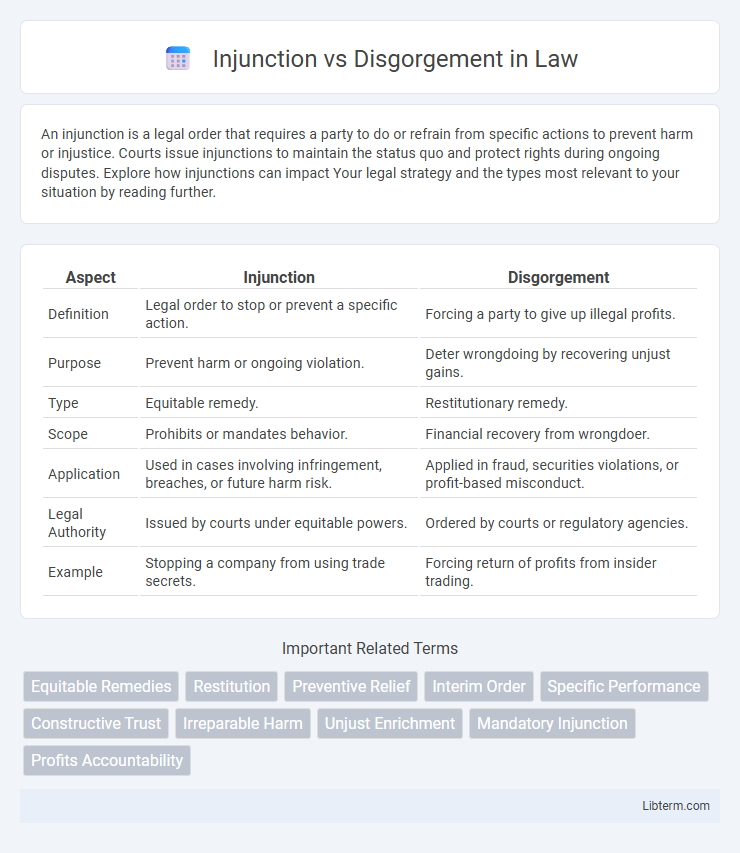An injunction is a legal order that requires a party to do or refrain from specific actions to prevent harm or injustice. Courts issue injunctions to maintain the status quo and protect rights during ongoing disputes. Explore how injunctions can impact Your legal strategy and the types most relevant to your situation by reading further.
Table of Comparison
| Aspect | Injunction | Disgorgement |
|---|---|---|
| Definition | Legal order to stop or prevent a specific action. | Forcing a party to give up illegal profits. |
| Purpose | Prevent harm or ongoing violation. | Deter wrongdoing by recovering unjust gains. |
| Type | Equitable remedy. | Restitutionary remedy. |
| Scope | Prohibits or mandates behavior. | Financial recovery from wrongdoer. |
| Application | Used in cases involving infringement, breaches, or future harm risk. | Applied in fraud, securities violations, or profit-based misconduct. |
| Legal Authority | Issued by courts under equitable powers. | Ordered by courts or regulatory agencies. |
| Example | Stopping a company from using trade secrets. | Forcing return of profits from insider trading. |
Introduction to Legal Remedies: Injunction vs Disgorgement
Injunctions serve as court orders that compel or prevent specific actions to protect legal rights, often used to halt ongoing or imminent harm. Disgorgement requires the defendant to surrender profits gained through unlawful or unethical conduct, focusing on restoring the status quo rather than punishment. Both remedies play critical roles in equity law, with injunctions addressing future conduct and disgorgement targeting financial restitution.
Defining Injunction: Purpose and Scope
An injunction is a court order that mandates a party to do or refrain from specific acts to prevent harm or maintain the status quo during litigation. Its primary purpose is to provide immediate relief and avert irreparable damage, often in cases involving intellectual property, contracts, or regulatory compliance. The scope of an injunction can be temporary, preliminary, or permanent, depending on the stage of the legal process and the nature of the dispute.
Understanding Disgorgement: Meaning and Application
Disgorgement is a legal remedy requiring wrongdoers to forfeit ill-gotten gains obtained through unlawful or unethical practices, restoring the status quo by preventing unjust enrichment. It is commonly applied in securities law, antitrust violations, and corporate fraud cases where profits made from misconduct must be returned to affected parties or regulatory bodies. Unlike injunctions that prohibit future actions, disgorgement focuses on financial restitution by stripping away benefits derived from past violations.
Key Differences Between Injunction and Disgorgement
Injunction and disgorgement serve distinct legal purposes; injunctions are court orders that compel or prohibit specific actions to prevent harm, while disgorgement requires the return of ill-gotten gains obtained through wrongful conduct. Injunctions focus on future conduct control, whereas disgorgement addresses remedy by stripping profits earned from unlawful activities. Key differences include their procedural use, with injunctions acting as equitable relief to maintain status quo and disgorgement functioning as a monetary remedy to deter and penalize violations.
Legal Criteria for Granting Injunctions
Legal criteria for granting injunctions require plaintiffs to demonstrate a likelihood of success on the merits, the possibility of irreparable harm without court intervention, and that the balance of equities favors the issuance of the injunction. Courts assess whether monetary damages are insufficient to remedy the harm, thus justifying injunctive relief. Injunctions differ from disgorgement, which focuses on recovering ill-gotten gains rather than preventing ongoing or future harm.
Circumstances Warranting Disgorgement Orders
Disgorgement orders are typically warranted in circumstances where defendants have obtained ill-gotten gains through unlawful conduct such as securities fraud, insider trading, or breach of fiduciary duty. Courts impose disgorgement to prevent unjust enrichment by requiring the return of profits gained from illegal or unethical behavior. This remedy is favored when monetary compensation to victims is necessary, whereas injunctions primarily aim to prevent or halt ongoing violations.
Common Scenarios: Injunction vs Disgorgement in Practice
Common scenarios involving injunctions typically include stopping ongoing or imminent unlawful actions, such as trademark infringement or breach of contract, to prevent further harm. Disgorgement is frequently applied in financial misconduct cases like securities fraud or insider trading to compel wrongdoers to surrender ill-gotten gains. Courts often combine injunctions and disgorgement remedies to both halt harmful behavior and restore unjust profits, ensuring comprehensive legal redress.
Recent Case Law and Judicial Trends
Recent case law demonstrates a growing judicial preference for employing injunctions to prevent ongoing or future violations, particularly in intellectual property and securities fraud contexts. Disgorgement remains a crucial remedy for recouping ill-gotten gains, with courts increasingly scrutinizing its application to ensure fairness and proportionality, as seen in landmark SEC enforcement actions. Judicial trends indicate a balancing approach, where injunctions serve as preventive tools while disgorgement addresses restitution, reflecting evolving standards in equitable relief.
Strategic Considerations for Legal Practitioners
Injunctions and disgorgement orders serve distinct strategic purposes for legal practitioners aiming to protect clients' interests and enforce compliance. Injunctions provide immediate relief by preventing ongoing or imminent harmful conduct, making them crucial for preserving the status quo during litigation or regulatory enforcement. Disgorgement focuses on remedying unjust enrichment by compelling wrongdoers to relinquish ill-gotten gains, often serving as both a deterrent and a financial remedy in securities, intellectual property, and antitrust cases.
Conclusion: Choosing the Appropriate Remedy
Selecting between injunction and disgorgement hinges on the specific legal objective: injunctions effectively prevent ongoing or future wrongful conduct by ordering parties to cease actions, while disgorgement compels the return of ill-gotten gains to deter unjust enrichment. Courts prioritize injunctions when immediate cessation of harm is crucial, but choose disgorgement to economically remedy past violations and restore fairness. Understanding the nature of the violation and the desired outcome ensures the appropriate remedy aligns with enforcing compliance and remedying damages.
Injunction Infographic

 libterm.com
libterm.com